The Four who Prevented Nuclear Annihilation
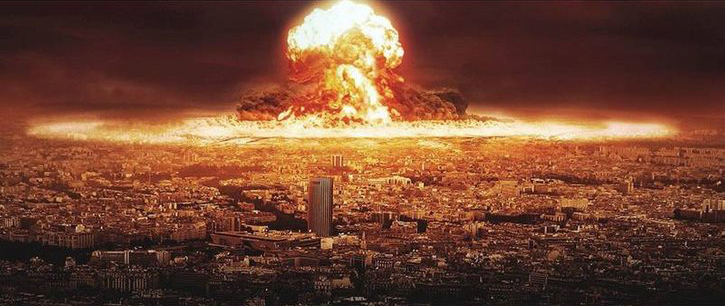
By Dan Gifford
The Doomsday Clock illustrating how close the world is to nuclear annihilation now reads two minutes to midnight. Midnight represents the destruction of human kind in a fireball blast of nuclear radiation in what would likely be the last global conflict, WWIII.
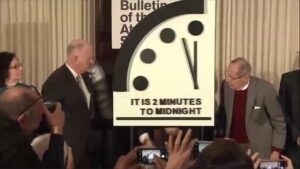
It's an illustrative metaphor created by the Society of Atomic Scientists with an obvious predictive flaw. Though the big hand adjusts its distance to midnight as known tensions between the powers possessing nuclear arms increase or ease, it cannot represent unknown tensions or some rogue or mistaken action that will trigger the sudden use of those weapons.
Rogue action and mistakes that would likely have caused WWIII are known to have happened three times since nuclear weapons have existed. The world did not freak at the time they occurred because, as "The Men in Black" say about the Earth ending threats posed by the extraterrestrial aliens they monitor, "the world didn't know about them."
That remained the case for years because of government secrecy. But we now know that in each situation, sane men, two of them Russian and two of them English, rose to the occasion and stopped events that would surely have started WWIII and the possible extermination of all life on Earth with it.
Vasili Alexandrovich Arkhipov.
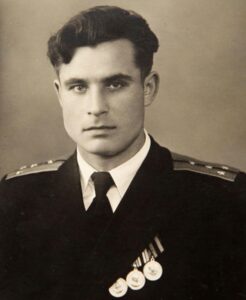
While flotilla commander of four Soviet submarines and the second-in-command of the diesel powered sub B-59, Arkhipov refused to authorize the firing of a torpedo with a nuclear warhead at the American aircraft carrier U.S.S. Randolph during 1962's Cuban Missile Crisis.
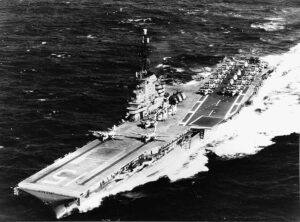
Similar to US Navy protocol, nuclear weapon use required the agreement of all three senior Russian officers on the sub. Arkhipov's single thumbs down prevented the strike and a likely American all-out thermonuclear response on the Soviet Union. In 2002 Thomas Blanton, the director of the US National Security Archive, said that Arkhipov "saved the world."
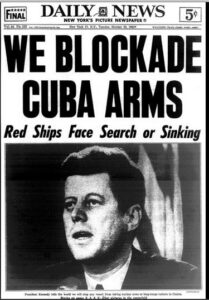
The preceding events unfolded during the Cuban Missile Crisis on October 27, 1962, now acknowledged as the most dangerous day so far in known history, when US Navy destroyers located the B-59 near Cuba and started dropping small depth charges intended to force the submarine to come to the surface for identification. But Soviet Captain Valentin Grigorievitch Savitsky didn't know that was the intent. He thought the American ships were trying destroy the K-59. Especially so since his sub had received no contact from Moscow for several days and only had American civilian broadcasts to determine what was happening in the world.
The B-59's isolation worsened when Savitsky dove deep to hide from the American war ships. At greater depth, B-59 could neither hear American radio broadcasts or communicate with Moscow. In that seclusion, Savitsky decided that World War III had probably started and decided to launch his nuclear torpedo. Unlike the other three subs in the Soviet flotilla, three officers on board B-59 had to unanimously agree to authorize a nuclear launch: Captain Savitsky, the political officer Ivan Semonovich Maslennikov, and the second-in-command Arkhipov. Other Soviet submarines armed with nuclear torpedoes usually required only the the captain's order and the agreement of the political officer all Soviet ships carried to enforce Marxist doctrine to launch them. But because Arkhipov was the commander of all four submarines in the flotilla and equal in rank to Captain Savitsky, his third vote of approval was required.
Soviet records say arguments among the three officers raged but that Arkhipov prevailed.
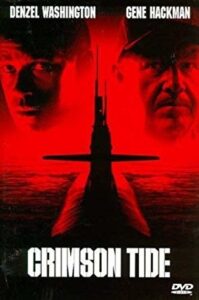
That drama was the inspiration of the 1995 film "Crimson Tide" starring Gene Hackman and Denzel Washington about the legitimacy of orders to launch a nuclear missile from an American submarine. Arkhipov persuaded Savitsky to surface and await orders from Moscow. That averted the nuclear Armageddon by mistake Arkhipov sought to prevent.
On their return to Russia, one senior admiral reportedly told the B-59 crew "It would have been better if you'd gone down with your ship." That attitude faded once cooler Kremlin heads prevailed regarding Arkhipov's ability to consider the dire consequences at stake under the conditions on the B-59. Its batteries were low, the air conditioning was down and carbon dioxide levels were building. Arkhipov's ability to think rationally in that situation reminded his superiors of the respect he earned from his earlier heroism aboard the K-19, the Soviet's first nuclear powered submarine.
It had a reactor cooling malfunction on its maiden voyage that threatened a reactor core meltdown. The captain and 27 crew members died from radiation poisoning. Arkhipov was irradiated during his actions to keep the core cool but not fatally so. That story was told in the (2002) film "K-19 - The Widowmaker" starring Harrison Ford and Liam Neeson.
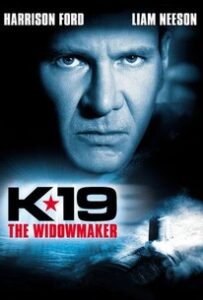
Hollywood fabricated the K-19 "widow maker" moniker. The Soviets actually nicknamed the sub "Hiroshima." But that nickname would have fit the B-59 as well. It wasn't known that the B-59 had nuclear weapons or that one was almost used until 40 years later in 2002. That was the year retired Commander Vadim Pavlovich Orlov revealed the subs were armed with nuclear torpedoes, that Arkhipov was the reason those weapons had not been fired and that the world owed Arkhipov its gratitude.
Stanislav Yevgrafovich Petrov.
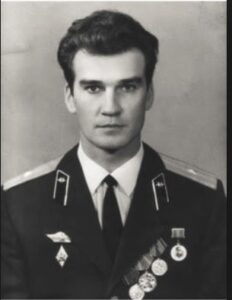
Lieutenant Colonel Petrov of the Soviet Air Defence Forces also became known as "the man who single-handedly saved the world from nuclear war" for his role during a 1983 Soviet nuclear false alarm incident.
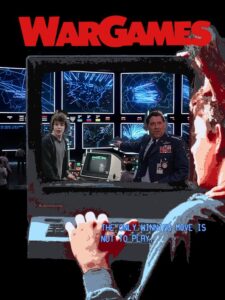
That false alarm mirrored the one in the 1983 film "War Games" in which a teen (Matthew Broderick) playing an online game of Global Thermonuclear War mistakenly causes the American air defense supercomputer to put the nation's nuclear arsenal into DEF CON 1 (the highest alert) launch mode in response to his simulated attack.
The crisis Petrov faced started September 26, 1983. That was three weeks after the Soviet military had shot down Korean Air Lines Flight 007 killing 269 men, women and children. The sheer brutality of the Soviet action had the world on edge, fearing it may mean the Soviets were girding for war. In that atmosphere, the Soviet nuclear early-warning system reported that a missile had been launched from the United States, followed by up to five more.
Duty officer Petrov made the sort of judgment decision computers cannot. He judged the reports to be false alarms because the number of missiles his system showed heading toward Russia were too few in number for a killing blow first strike that would prevent Soviet retaliation. It was a high stakes judgment, but the evidence of malfunction was sufficient, Petrov believed, for him to disobey standing Soviet military order protocol to immediately launch a massive Soviet counter attack. Because he didn't, Petrov is credited with having prevented an erroneous retaliatory nuclear attack on the United States and its NATO allies that would have resulted in large-scale nuclear war.
General Sir Michael David Jackson and James Blunt.
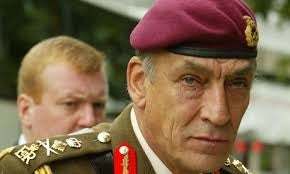
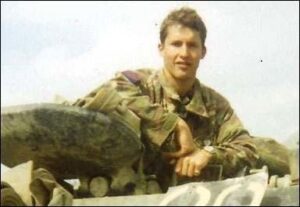
When the the various ethnicities and religions in the Socialist Federal Republic of Yugoslavia demanded their own countries after the fall of the Soviet Union, the break-up spawned a series of vicious wars and score settling. Those wars were rife with ethnic cleansing, rapes and other murderous depravities that were rooted in ancient religious and tribal hatreds extending to and before Roman times. Until that happened, most Americans did not realize the only reason there had been a Yugoslavia was because communist dictator Josip Broz Tito had forced the various groups together and kept them together at gunpoint.
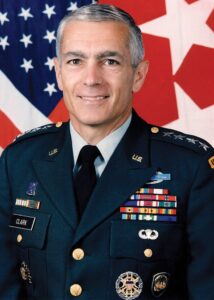
When Christian Serbia refused to halt its ethnic cleansing of Muslim Kosovo, NATO sent US Army General Wesley Clark, NATO's Supreme Allied Commander Europe, to bomb the Serbs until they stopped their butchery. Said bombing started March 24, 1999. Clark assured all the Serbs would fold in three days. That belief was a classic miscalculation of opponent resolve and grit. Whatever Clark and NATO thought of the Serbians and the other warring Balkan tribes, they were all tough, true believers in their cause who were steeped in and toughened by more than a thousand years of vicious tribal and religious warfare that was beyond the comprehension of outsiders like Clark.
So after three days of bombing stretched to ten weeks plus diplomatic pressure from Serbia's fellow Slavic traditional protector Russia, the Serbs agreed to withdraw from Kosovo and allow NATO and Russian troops to enter the province and keep the factions separated. 30,000 NATO troops then swept in from from the south and west. Their job as peace keepers was to ensure that the Serb forces evacuated and that neither the KLA (Kosovo Liberation Army) or the Serbs would attack each other while the Serbs retreated. British General Michael Jackson was in charge of the multi national NATO ground forces composed of units from Britain, France, Germany, Italy and the US. Spearheading the column was a contingent of 500 British and French paratroopers led by British Captain James Blunt. Their job was to secure the airport at Kosovo's capital, Pristina.
Meanwhile, the Russian troops were also on the move. The Russians were not happy about being subordinated to NATO command and wanted control of their own sector. NATO, fearing this would lead to the partitioning of Kosovo into "North" and "South" Kosovo, reminiscent of so many other Cold War clashes, insisted that all troops in Kosovo be under NATO command. So the Russians decided to "make a statement." When Captain Blunt's paratroopers approached Pristina airport, they were surprised to find 200 Russian troops dug in and aiming their weapons at them. To underscore how serious the Russians were, those 200 soldiers were led by two star General Victor Zavarzin. Blunt understood the gravity of that fact. General was far too high a rank to be leading 200 men into a combat zone in modern times unless big time geo political issues were at stake.
Blunt informed NATO command of the situation, but General Wesley Clark then ordered the paratroopers to seize the airport by force. Realizing that attacking Russian troops would have serious consequences, Blunt questioned the order and consulted with General Jackson. Jackson knew how to deal with slighted Russians. He grabbed a bottle of whiskey and a box of cigars and flew into the airport to personally meet with General Zavarzin.
Jackson could see the Russians were serious. On the other hand, Jackson also realized the Russians were isolated. After meeting with Zavarzin, Jackson met with General Clark to discuss the situation. Clark didn't like his orders being questioned and repeated his order to take the airfield by force. Jackson refused, stating "Sir, I'm not going to start World War Three for you". Jackson then informed his British superiors that he had refused a command from a superior officer and offered his resignation. It was refused.
Jackson then ordered Blunt's paratroopers to encircle and cut off the Russians at the airport. As Blunt put it, Jackson said "why don't we sugar off down the road, you know, encircle the airfield instead", which Blunt did. After two days, the Russians and NATO came to an agreement. The Russians would not be under NATO command, but their forces would be dispersed throughout Kosovo. There would be no partitioning of Kosovo. The crisis was averted.
For his leadership in Kosovo, British General Michael Jackson (AKA Mike Jackson) received the Distinguished Service Order (DSO). Later he became the Chief of the General Staff of the British Army. He retired from service in 2006 after nearly 45 years of military service. US General Wesley Clark was informed a month after the airport incident that he would be prematurely replaced as commander of NATO forces. The usual routine for a replaced general is to give him a temporary special assignment until a command opens up.
That was not done in Clark's case. Clark retired from service and made an unsuccessful presidential bid as a Democrat in 2004. British Captain James Blunt went on to become a famous singer-songwriter, perhaps best-known for "You're Beautiful" and "1973".

His albums have sold over 18 million copies and his debut album "Back to Bedlam" was the best-selling album of the 2000s in Britain. During a BBC interview, Blunt said he was willing to risk a court martial by rejecting the order from a US General. "The soldiers directly behind me were from the Parachute Regiment, so they're obviously game for the fight," said Blunt. But when he heard words from Clark like "destroy" used against an alleged NATO ally, Blunt said he realized he was in a "mad situation" that required he fall back on the sense of moral judgment that he said is drilled into British Army soldiers. All of the men mentioned used moral judgment in their decisions and we are likely here today because they did.
-----
Dan Gifford is a national Emmy-winning, Oscar-nominated film producer and former reporter for CNN, The MacNeil Lehrer News Hour and ABC News.
###